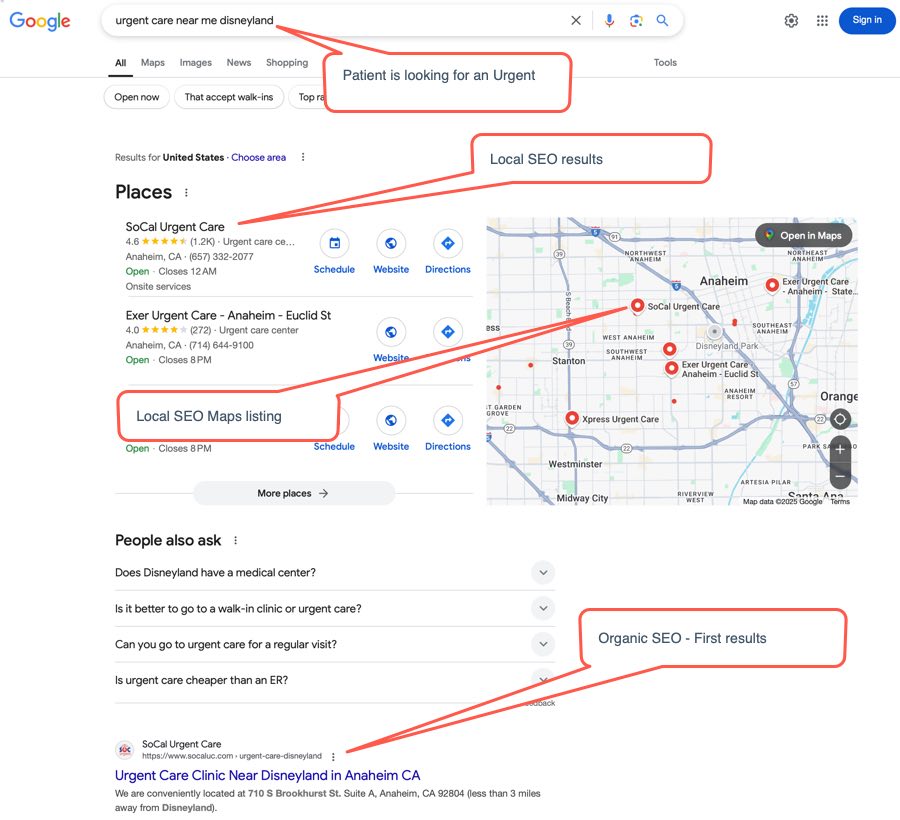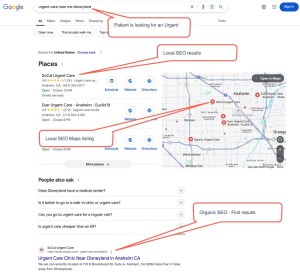How to Get Good Medical SEO Rankings for Your Website?
This is a common question. Everyday PatientGain receives inquiries from medical doctors and practice managers. Most of the time it is related to SEO and advertising and one third of the time it is about increasing functionality of an existing website a.k.a apps for websites.
If you have a medical practice, the vast majority of your new patients are going to learn about you and make a health care decision by viewing your website. However, they will never get that chance to consider you if they can’t find your website. You need to ensure your site has good SEO rankings. Without good SEO Rankings, patients will either not be able to find you, or you will have to spend a significant amount of money on advertising to place your website in front of your target audience. Fortunately, how to get good SEO Rankings is not a mysterious, nebulous concept. There are tried and proven ways to improve your website’s SEO Rankings.
Getting good medical SEO rankings for your website can be a complex process, but there are several steps you can take to increase your website’s visibility and improve your search engine rankings. Here are some tips to help you optimize your website for medical SEO:
- Conduct keyword research: Identify the most relevant keywords and phrases that potential patients might use to search for your services. Use tools like Google AdWords Keyword Planner, SEMrush, or Ahrefs to find high-volume keywords with low competition.
- Optimize your website structure: Ensure that your website is structured in a way that is easy for search engines to crawl and index. This includes using clear, concise URLs, having a sitemap, and organizing your content into relevant categories.
- Create quality content: Develop informative, engaging, and original content that provides value to your target audience. Use targeted keywords in your headlines, subheadings, and throughout your content to help search engines understand the focus of your page.
- Build quality backlinks: Acquire high-quality backlinks to your website from reputable sources. This can include other medical websites, professional organizations, or government health agencies.
- Optimize your website for mobile: Make sure your website is optimized for mobile devices, as more and more people are using smartphones and tablets to search for medical information.
- Leverage local search: If you are a local medical provider, optimize your website for local search by including your city or region in your website’s title tags, meta descriptions, and content.
- Monitor your website’s performance: Use tools like Google Analytics to track your website’s traffic and identify areas for improvement. Regularly update your website with new content and optimize your SEO strategy based on your performance data.
By following these steps, you can improve your medical SEO rankings and increase your visibility to potential patients. However, keep in mind that SEO is an ongoing process, and it may take some time to see significant results.
Medical Search Engine Optimization (SEO)
Search Engine Optimization is one of the most critical parts of SEO Rankings. SEO is short for Search Engine Optimization, so much of your work will be in this area. You must apply SEO strategies to get your rankings to improve. First, you must determine who your target audience is and what words they use when searching for solutions to their healthcare problems your medical practice can solve. Remember, not everyone is well versed in medical terms, and you should not ignore common words people use when using search engines. For example, “Tennis Elbow” is not official medical terms. However, people are more likely to search “Treatments for Tennis Elbow” as opposed to “Treatments for lateral epicondylitis.”
Once you have determined the keywords your target audience uses, it is time to insert them throughout the content of your website. Apply these keywords using the “Goldilocks Ratio.” You don’t want too few keywords, but you also do not want too many. Too few, and they will not make a difference, and if you pack your content with keywords, search engines will detect this and penalize you. What is the right ratio? There is no exact number you should or shouldn’t use. If it feels unnatural reading the keywords in your content, it is probably time to take a few out.


Content Marketing
When search engines begin to look through the internet to provide solutions to people’s queries, they are looking for the most relevant websites. Their goal is to present results that can answer a person’s questions and is pertinent to their need. To make your site more relevant in search, you need to engage in content marketing. Successful content marketing is a long term process, but it can be highly cost-effective if done correctly.
Content marketing is a relatively straightforward process. You are updating, adding, and expanding the content on your website to present your site as more authoritative on a topic and relevant. For example, instead of just listing your services on a single page, have that list link out to new pages talking about each service. Those service pages should be informative talking about the process, symptoms it will relieve or results someone should expect, and when a patient could use such a service. The information provided on these pages will help educate your patients and show a search engine that you are an excellent choice for them. The more people click on a website and spend time reading your content is also another signal to search engines you are a relevant choice
A mistake many medical practices make when engaging in content marketing is updating their entire website at once. If practical, incrementally add, update, and expand the content on your website. Proceeding in this way will show search engines you are continually updating your website, and therefore it is more up to date. It also isn’t such a terrible idea to review your content to make sure it is up to date. Even if you wrote the “perfect” page about a treatment, you should check-in now and again to make sure the information on there is still accurate.
Local Search Engine Optimization
Just as it is crucial to have the right keywords on your website, it is vital to have the right words referring to where your clinic is located as well. When you are talking about the services you offer and using your SEO target words, include the words people use when referring to the area, your medical facility is located. Include those words and the words that relate to the areas around your location. For example, if your pediatric urgent care center is located in Philadelphia, you will want to mention Philadelphia, the neighborhood it is located in, zip codes, and even other landmarks nearby. Using these local keywords will associate your business with that area making it more relevant to people’s searches in the local area. Potential patients are generally going to want to find a healthcare solution close to where they live. By making your clinic a suitable local choice, you only increase your chances of being their one and only first choice.
Time and Patience
Medical SEO Rankings generally do not happen overnight. Changes one day will not result in immediate changes in your rankings the following day. Depending on the search environment in your immediate location, you may see wild swings in search rankings day to day until things stabilize. When you make significant changes to your website to improve its ranking, you are also affecting the rankings of your competitors. Your change in rankings will, if they are paying attention, become apparent, forcing them to make changes to their website if they are severely affected. It isn’t uncommon to see websites start changing little by little over time as they try to counter the changes by their competitors. Overall, the key is to giving your changes time to see how they help your website improve its overall rankings.
Getting high medical SEO rankings requires time, patience, and picking the right words to use in your ever-expanding content on your website. Unlike paid ads, which are quick to appear and may quickly drive traffic to your website, the tactics to improve your SEO rankings will gradually begin to show results. As an added bonus, pages that are more relevant and have increased SEO value will make your paid marketing efforts more effective as well! Call PaitientGain.com today to see how we can improve your SEO Rankings!
E-A-T Algorithm & SEO For Doctors
There are three words to remember E A T for good medical SEO website.
E Stands for medical Expertise in the subject matter. For example if your website page is about Peripheral Artery Disease (PAD) – do you have useful information about the subject matter.
A Stands for medical Authority in the subject matter. This refers to the qualified, authoritative content and possibly the author of the website page.
T Stands for Trustworthy source or organization. This refers to the fact that is the website can be trusted. How good is the rest of the content on your website. For example if there is doctor’s bio present on a medical website. Are there any other references to this doctor in other media outlets. Are there links pointing back to the bio of the doctor. There are many other factors that determine the trustworthiness.
In addition, SEO for doctors depends on:
1) Clinic Industry Knowledge and Content Writing Skills
2) Expertise in Search Engine Algorithms, Digital Best Practices, and Patient Behavior
3) A Dynamic Software Platform Designed to Adapt to Changes with Trends and Technology
4) World Class Support behind Your Technology System
Achieving top SEO rankings for medical practices and physicians is a process and not a simple one-time setup. It is time-intensive, requires deep knowledge about your own medical practice and Search Engine technology, costs both money and time to get real results, and it never stops for your medical practice.
